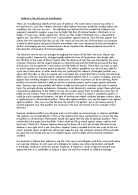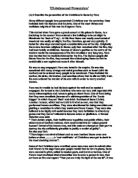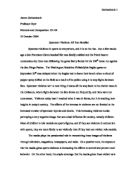Explain what religious people might do to help the victims of war
Explain what religious people might do to help the victims of war Religious people believe in stewardship and in the sanctity of life and therefore this means they would do anything to help the victims of war. The religious people also will help anyone no matter what side they are because they believe that life is sacred and must not be destroyed. Christians and Muslims believe in these teachings and therefore will help anyone suffering because they think it is wrong to see them suffering and they must stop that. They believe that GOD makes everyone in his own image so by harming other humans we are harming GOD. The quote in the Islamic Quran says in Hadith 13 that to treat others how you would be like to be treated. This teaches Muslims that they should help people and victims because that’s how they would like to be treated. In the Bible in Matthew 5:38-48 it teaches Christians about bringing your enemies closer so basically saying you should not discriminate if they are your enemy and you should help anyone and everyone possible. Religious charities are also present and they help victims of war without any hesitation or discrimination. Some of them are Medicines sans Frontiers, British Legion, and Help for Heroes. The more known and global ones are Red Crescent which is an Islamic based charity and the Red Cross which is a Christian based charity. The Red Crescent is
Violence is the only way to end disputes
Violence is the only way to end disputes There are miscellaneous beliefs on the uses of violence. The main Cristian view of war ethics is the doctrine of a Just War. Modern Christians often believe that wars should be avoided unless the conditions of a Just war are met. An individual may believe that the standard of evidence and argument required to support a war may be hight that that of national leaders. Christianity is no longer, if it ever was, wholly against war. Some say that modern Christianity has a ‘presumption against war,’ but others say that it has a ‘presumption against injustice,’ thus the bias against war comes from the injustice that war can do. This view says that the aim of Christianity is to promote a world in which peace and justice flourish everywhere: war may sometimes be the tool needed to do this, and waging war may sometimes be a lesser injustice than allowing injustice to persist or tolerating the victimisation of innocent people. The Christian view of war has changes throughout the history of the faith. the early Church was strongly pacifist, however this changed rapidly within the time of Constantine, who fought with the ‘Chi Rho’ in the name of Christ. shortly after the doctrine of Just War was formulated. For many centuries Christians did not regard violence as inherently bad and this thinking uncovered the idea of holy wars, for
'In the light of ethical theory, discuss arguments for and against pacifism.'
'In the light of ethical theory, discuss arguments for and against pacifism.' Pacifism subscribes to the idea of peace being the best goal and they best means of achieving peace is always through peaceful methods. So pacifists reject the use if physical force, even in the defence, and maintain war is always wrong. When it comes to pacifism there are arguments both for and against its wide spread use. Arguments for include the teachings of Jesus, which show that he taught about love our neighbours as ourselves and that we should turn our cheek to violence against us. This is shown in Matthew 26:52 Jesus instructs Peter to drop his sword and not fight the Roman guard and says 'all who live by the sword, will die by the sword.' And again in Luke 6:7 where he instructed 'if someone strikes your cheek, turn to him the other also.' These show Jesus was very much a pacifist himself and as we are taught to follow Jesus example we should also adopt pacifist views. Another argument in favour of pacifism is that of the Hebrew idea of Shalom. Shalom is a Hebrew word, which can be translated to mean peace. However the idea behind shalom is much more than peace. It embraces wholeness, a complete well-being, and a lively harmony. It is about trust, openness, caring and justice. Shalom is a gift from God and was brought to earth by Jesus. Different Christian organisations have taken what
'I WISH I HAD NEVER, EVER, THOUGHT OF BUYING IT'
'I WISH I HAD NEVER, EVER, THOUGHT OF BUYING IT' Dadsam Nushies had been king and ruler of Qrai for 15 years now, he had been at war for ten of them, fighting the evil fanatics in neighbouring Nrai. At last, he had made friends and alliances with some of the most powerful and technologically advanced kingdoms on planet Treah. They had done him a deal that could end this war. Qrai was blessed with large deposits of the Carbon based fuel oil, which was highly prized throughout the planet. Dadsam could trade a reasonably small amount of fuel cells, in exchange for weapons. Weapons that his neighbour could only dream about. He could end this war and create the peace that his country so craved. These new weapons would be a show of strength so great that the fanatics would soon bow to a sensible peace agreement. Dadsam wasn't greedy he didn't want to invade Nrai. In fact he wanted nothing to do with them. His new friends Maj Gen Gwushby and Prime Minister Noty Larib were both on the Council of United Kingdoms, they would be powerful allies indeed. The new weapons worked. As soon as the Nrai learnt of the Arms deal they proceeded to come to an amicable peace with the Qrai. A peace that was 10 years overdue. 0 years passed..... The peace in this troubled area of the planet could last only so long. Dadsam received reports that the large deposits of oil were being
Explain the arguments put forward by some Christian pacifists and demonstrate how Christian non-pacifists might support their position
Explain the arguments put forward by some Christian pacifists and demonstrate how Christian non-pacifists might support their position. Christian pacifists could argue that Jesus' teaching and examples are clearly against violence so why shouldn't other Christians spread Jesus' teachings? Also, St. Paul wrote to the Romans: For it is written: 'It is mine to avenge; I will repay' says the Lord. (Romans 12:19-20) This means that even if someone attacks you, you should not attack them back. Christian pacifists could argue that all Christians should follow the Ten Commandments, one of which includes: You shall not murder (Exodus 20:13) One of the most antiwar arguments is the fact that wars result in the deaths of innocent people and, therefore, war is necessarily immoral. For example, the War in Iraq has caused approximately a minimum of 8000 civilian deaths. Another argument that could be put forward is that, violence only leads to more violence. An example of this is the effects of the war in Iraq which have led to guerrilla activities everyday such as car bombs even after Sadam Hussein was captured. Car bombs were even thrown on Red Cross' transportation. Also, the need for war would disappear if the money spent on weapons was spent instead on eradicating the causes of the war, for example, poverty. A Christian pacifist could say that the aim of non-violent
Describe the persecution of the Christians in Rome by Nero.
'Christians and Persecution' (A) I Describe the persecution of the Christians in Rome by Nero Many different people have persecuted Christians over the centuries; these included both the Romans and the Jews. One of the most vicious and malicious culprits of this was the Emperor Nero. This started when Nero gave a grand concert at his palace in Rome. As a backdrop to the concert Nero ordered a few buildings to be set alight to illuminate the 'Sack of Troy'. At this time Rome was mostly constructed of wood and was easily set alight, the fire, therefore, spread very quickly. It lasted for nine days and destroyed a considerable area of the city. Originally there were fourteen religions in Rome; only four remained after the fire, they had been totally annihilated. Because of Rome's position as the centre of the western world the consequences of the fire travelled a very long way. Nero was worried that he would be blamed for the fire. The Roman people did blame Nero for the fire, they accused him of destroying Rome so that he could build a new capital and name it after himself. He was an easy scapegoat; Nero was hated in the empire. He was also associated with many strange and weird practices such as incest (with his mother) and he ordered many people to be murdered. These included his mother, his sister, his brother, and countless others that he did not fully trust. He even
Some Christians believe in the Just War Theory which was originally written in the 3rd Century AD by St. Augaustine
PEACE AND JUSTICE BY SARAH SWINTON 10JN War is when armed conflict between two or more opposing groups. War is caused by conflict between people or countries which ends up as war. Some of the causes of war are: * Greed. * Racial problems. * Religion. * To stop a tyrant or dictator. There are many effects of war. Some of these are: * Many children become soldiers who fight and kill. * Refugees- there are 15 million refugees worldwide; they flee their homes and have to live in other countries. * Environmental- cost to the environment and wildlife will probably never be known- for example in the Gulf War oil refines were burnt. * Psychological- some children and adults will never get over brutalises they have suffered or witnessed. * Shell-Shock - in WW1 many soldiers were shot for cowardice or again AWOL (Absent With Out Leave) when if fact they were mentally ill, many such soldiers now have been pardoned * Land mines- many people want to go home but the fields and farmland are riddled with land mines designed to maim and kill. * Ill health- some soldiers suffer for years from the effects of gas bombs and other long term effects. Some Christians believe in the Just War Theory which was originally written in the 3rd Century AD by St. Augaustine who wrote 2 of the criteria's for the Just War. Then 1000years later Thomas Aquinis modified the two criteria's St.
My Role Model - Mahatma Gandhi.
My Role Model I personally believe that a good role model should have certain qualities, and he should... * Have a good personality * Be humble * Be respectable * Be ambitious His proper name is Mohandas Karamchand Gandhi. Gandhi was born on October the 2nd, 1869. He was born in Porbandar, in the modern state of Gujarat in India. He had gone to London in 1888 to train as a lawyer. He qualified three years later and returned to India. His most important wish was to make India an independent country, free from the ruling of the British Empire. He succeeded in doing this in 1947. He also wanted to abolish racial discrimination. Gandhi left for South Africa in 1893, to serve as a legal adviser for an Indian firm. During the 21 years that he spent in South Africa, he was subjected to a great amount of racial discrimination amongst him and his countrymen. He had developed a method of non-violent resistance which he called 'satyagraha', and which he used to his success. He had finally returned to India in 1915 as a changed man. Upon returning to India, he set out to travel the entire country to familiarise himself with it. He then plunged into politics and became an unquestioned leader of the Indian nationalist movement. In 1919 he led a nationwide campaign of passive non-cooperation with the government of British India, including a boycott of British goods. This was when he
Christians in developed countries.
Christians in developed countries feel and believe that they should have reverence for the marginalized and seek not just to improve the condition of these people in life but also to bring about equality and live up to their responsibility of caring for all. We can learn about this from the Old Testament and Jesus' teachings. In Mt 22.34-40, we learn that the greatest commandment is to, "love your neighbour as you love yourself." Christians try to develop qualities of Christian love, known as agape. They do this by showing compassion towards others, respect and tolerance. They can also do this by reading the bible and following the acts of others, such as Jesus. By doing this Christians hope to become more like Christ. Once confirmed, Catholics have confirmed their commitment and responsibilities to Christ, by doing this they are now official followers of Christ and they believe they should follow in his ways and apply them to daily life and by confirming themselves to Christ, Catholics mean to serve him and others. "If one of you wants to be great, he must be servant of the rest, and if one of you wants to be first, he must be slave of all." Request of James And John. This passage explains that true greatness is about saving others. This is major Christian responsibility. Christians can do this by putting themselves last and putting the needs of others before their
Spectator violence in sports is everywhere, and it is on the rise. Just a few weeks ago a San Francisco Giants baseball fan was fatally stabbed and his friend beaten unconscious by three men following the game Barry
Aaron Gerhardstein Professor Dyer Rhetoric and Composition 131-04 25 October 2004 Spectator Violence All Too Familiar Spectator violence in sports is everywhere, and it is on the rise. Just a few weeks ago a San Francisco Giants baseball fan was fatally stabbed and his friend beaten unconscious by three men following the game Barry Bonds hit his 700th home run against the San Diego Padres. The Washington Redskins-Philadelphia Eagles game on September 20th was delayed when the Eagles had to leave their bench when a cloud of pepper spray drifted on the field as a result of the police using it to stop fights between fans. Spectator violence isn't a new thing; it dates all the way back to the chariot races in the Coliseum, where fights between the fans broke out frequently, and riots were not uncommon. Violence today hasn't reached what it was in Rome, but it is reaching new heights in today's society. The effects of the increase in violence are not limited to the increased number of spectator injuries and deaths. This increasing violence is also portraying a very negative image that sets a bad influence for society, namely children. Most of children's role models are sports figures, and if they see violence in connection with sports, they are more likely to act violently than if they had non-violent role models. The media plays the paradoxical role in transmitting











